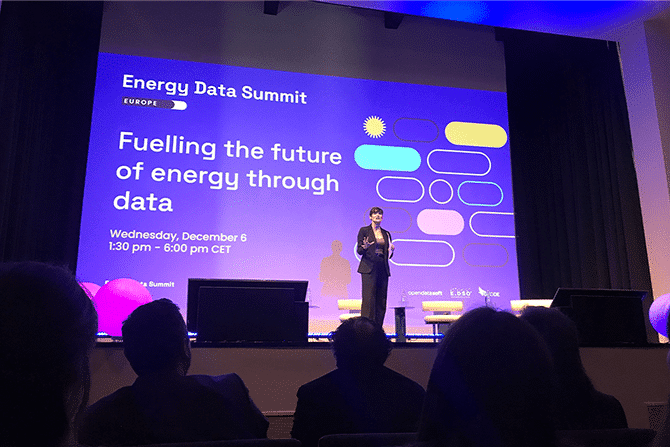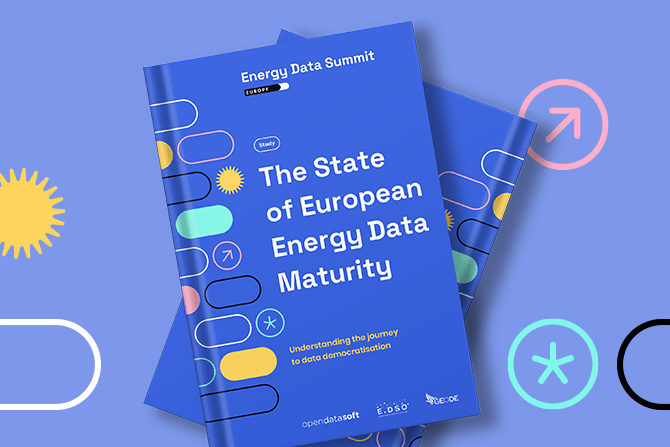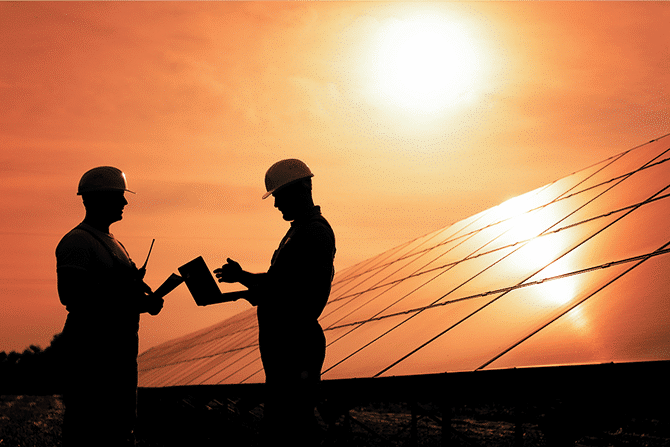Study: Data maturity in the European energy sector

How is the European energy sector harnessing data to achieve its objectives? Based on our new State of European Energy Data Maturity Study, we explain where the sector is now, and how it needs to transform to become fully data-centric moving forward.
The energy sector faces increasing challenges as it looks to achieve decarbonization, digitalization and energy security. Players need to become more efficient, customer-centric, innovative and collaborative to transform operations and deliver on Net Zero objectives.
Data is key to this transformation process. Only by sharing data effectively internally and externally with partners, consumers, and other energy players can the sector build effective ecosystems that deliver on changing customer and operational needs. Data democratization is at the heart of future success.
The journey to data democratization for energy players
To better understand the current state of data sharing, Opendatasoft carried out in-depth research with players across the European energy sector. Partnering with industry bodies E.DSO and GEODE, the State of European Energy Data Maturity Study is based on extensive research with Distribution System Operators (DSOs), energy producers, Transmission System Operators (TSOs) and other players, including tech providers, public energy authorities, and other utilities.
The Study paints a picture of a sector that is moving forward rapidly to harness data, but that understands it needs to do more to become truly data-centric. It recognizes current challenges and has ambitious plans for the future to increase external and internal collaboration and innovation through data.
Four key findings around data maturity in the energy sector
Companies understand the benefits that data brings
Respondents recognize that data plays an essential part in their current and future operations, across a wide range of areas. For example, 100% say it helps them become more efficient, while 98% see it as essential to ensuring digital transformation. 92% either have a data use strategy in place, or plan to introduce one in the next 36 months.
Companies are beginning to put in place the structures to better manage and share data. 88% have implemented data governance processes, while 78% have appointed someone to lead on managing data access and distribution/sharing.
Showing the level of progress, the vast majority (81%) think they are either on par with, or ahead of, the wider utility market when it comes to data use. All of this shows that senior managers understand the potential of data for meeting their business needs and are taking the first steps to harness it.
Many organizations are still early in their data journey
While nearly half of respondents have a strategy in place, and 76% have assigned sufficient financial resources, the research found that currently data is being used tactically and internally, rather than to drive innovation and external collaboration. For example, while 84% believe that data can help decarbonization, just 18% currently rank it as a first or second priority. Other, more pressing needs, such as efficiency, cited by three-quarters (75%) of people as a first or second priority, are currently the major focus.
Data sharing is focused internally – while 86% provide employees with access to data, just 71% of companies share information with customers or partners. Even internally, data use is limited – just 33% make data-driven decisions, for example. All of this demonstrates that energy players are not yet in a position to get full value from their data, and lack the maturity to exploit it in more advanced use cases.
Energy players face a range of challenges to becoming data-centric
Reinforcing the scale of the transformation required to industrialize data use, 73% say they face challenges to achieving their data sharing goals. Chief among these are poor data quality (an issue for 84% of companies), lack of a data culture (73%) and the complexity of technical tools (64%).
Many of these challenges stem from the size and existing structures of energy players. Data is generated across the business, but without effective data governance it can be difficult to guarantee its quality or to free it from departmental silos. Employees may be hesitant to experiment and use data in their working lives. Backing this up, just 59% of respondents say that they have the right skills, culture and governance resources in place to encourage greater data use.
Maturity will accelerate over the next 3 years
Looking forward, energy players have impressive plans for accelerating their data democratization journeys. They recognize the need to build on their existing efforts and are putting in place the resources to deliver on their strategies across both internal and external data sharing.
For example, while 33% have roles dedicated to data sharing in place now, a further 53% expect to create them within three years. 51% will increase their investment in data sharing tools and 61% will train staff on better using data in their jobs in the same timeframe. How they share data internally and externally will also transform. 90% will have created a dedicated internal space for data sharing with employees, while 82% will offer partners their own external data sharing space, up from 43% now. If plans are fulfilled, all of this points to a more collaborative, data-centric future for the entire energy ecosystem.
Sparking change through data democratization
Across the European energy sector, players are increasing their commitment to data sharing, with the ultimate aim of democratizing data use internally and externally to deliver on their own, and society’s, objectives.
As part of this, Opendatasoft recently hosted an international energy data summit in Brussels, bringing together representatives from across Europe. During the event, an expert roundtable discussed the key findings of the report and in particular how data maturity can be increased. Highlights of the conversation included:
- Jose Ferrari Careto, CEO, E-REDES: It is important to share data for free with the market – it is very easy to build an open data platform, break down silos and share data. Don’t reinvent the wheel when it comes to data – reuse the data you have already. It is impossible to have flexibility without data.
- Ramon Gallart Fernandez, Director of Innovation, Anell: Reskilling and digitalization is important, alongside creating the infrastructure to get to the data. Together, data, infrastructure and culture will drive value. Using data provides the opportunity to create momentum to change the energy sector.
- Yiu-Shing Pang, Open Data Manager, UK Power Networks: Data sharing is about creating a culture, engaging with business and stakeholders to find use cases. It is important to collaborate across the industry, such as around defining common standards. Exchange ideas and talk across the ecosystem.
The State of European Energy Data Sharing Study provides a detailed view of a sector that has begun its data sharing journey and recognizes the importance of data to its overall success. Companies are growing in maturity, and are committed to learning from their peers, and organizations in other industries, to deliver data-centric transformation. To support this the report also gathers and shares best practices, providing clear recommendations to help energy players continually learn and improve in their use of data. To find out more download the full study here.

At a time of disruption and change in the energy sector, data use and sharing at scale allows companies to meet their pressing challenges and drive decarbonisation. To understand the current state of data democratisation across the European energy sector Opendatasoft carried out in-depth research, partnering with E.DSO and GEODE to survey players from across the European energy ecosystem. The Study highlights the progress that companies are making around data sharing, and outlines their ambitious plans for the future, as well as including comprehensive best practice recommendations for driving improvements.

Industry regulator Ofwat is introducing new requirements around data sharing for the UK water sector. We explore the benefits of opening data across the sector and highlight best practice examples of other utilities that water companies can learn from.


